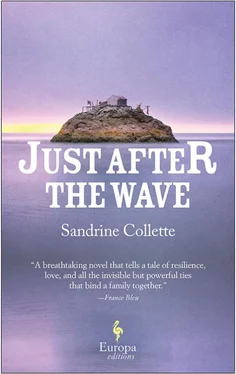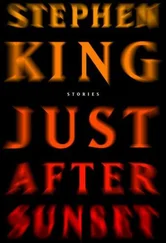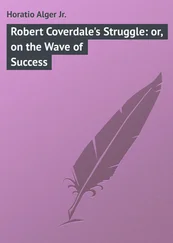And after that he lay down and closed his eyes because of the tears—the tears that welled up because he had failed, and the tears of relief that he would never, ever, have to get on that raft again.
It’s the water that is driving them mad, Louie is sure of it. He has decided that every morning he will open the door to the staircase and measure the rising of the water level, in addition to the stakes he has been planting in the garden as benchmarks. Every morning his heart begins to beat faster, his hands tremble. He can sense the sea there in front of him, behind him. On either side. He can hear the seepage, sometimes the waves, the faint laughter. He can smell the odor of warm stagnant water on the land, slightly rank, slightly nauseating. Sometimes he is sorry he didn’t go after the raft to try and build something better; a split second later he remembers the gurgling sounds and the fear, and he is not sorry at all.
But now this is driving him crazy, this ocean creeping closer, especially at night when no one can see it, at dawn the sea surprises them with its silent waves, ever higher, and the hens squawk because there is hardly anything left to peck at on the last bit of land that is holding out—for a few days the children fed them potato peels but now there’s nothing left. They’ve begun to eat their own eggs, and the children have to collect them earlier and earlier if they want there to be any left.
Louie thinks about the other island, full of potatoes. He could have taken the hens there, they would have found enough to eat—and he could have picked a pile of little potatoes, they could have had golden new potatoes in the pan, just the thought of it sets his stomach to rumbling. An entire island all to themselves, Louie, Perrine, and Noah, which they can neither reach nor eat, because the rubber raft was punctured and they cannot build a wooden one. This makes the older boy all the angrier on those mornings when the sea is licking at the land, ever nearer, and the hens leave the house, complaining. He can’t swim that far—or maybe he could, with a board to help him, God knows he’s thought about it often enough, but he’d have to be sure there were no storms or currents, and he cannot swear to anything anymore, the weather changes too abruptly and the summer has become treacherous. If one day the sky is an immense blue carpet, should he try his luck?
A panful of potatoes before drowning.
Stupid.
In the end none of that changes anything, the water everywhere around them makes them say foolish things, makes their minds unsteady, and yesterday a red hen ran to the sea, jumped off the shore with a little rustle of feathers, splish splash , then swam away with the horizon in her sights, Perrine cupped her hands around her mouth and called, Where are you going? The hen didn’t turn back, didn’t try to come back. They saw no more of her. Louie wishes he too could just leave like that, so that the fear and abandonment would cease. No more feeling the tightness in his throat, his arms dangling by his sides because he’s run out of ideas, doesn’t know what to do anymore, what to hope for. Let it all go. No, he can’t.
He is still here.
All he’s good for is wandering around the island in the early morning to see if the red hen has come home.
She hasn’t.
Does a hen sink?
—and what if they’d used the hens as floats.
You see how it makes you go crazy.
After a great deal of hesitation, Perrine and Noah again asked him to kill a bird so they could eat it. Perrine and Noah are hungry. But they don’t know how to wring a chicken’s neck, how to empty out it innards and pluck it. We have eggs, barks Louie, yet again. For them it’s not enough. They want meat, they want something roasted.
Louie doesn’t tell them that he is hoping to keep the hens until Pata’s return, to hand his flock over to him like a good shepherd, a good boy.
I’m a shepherd of hens.
And whether he’ll make it? He doesn’t know.
The parents left nine days ago. Nine days assiduously crossed off on Perrine’s sheet of paper, and there should be five or six left—if everything goes to plan. But everything has gone to pieces. His parents’ calculations are worthless now, don’t mean a thing, not a chance, they’re meaningless in light of the storm and the rising waters, the vast floods that are still poisoning the planet, they got it wrong from the get-go, because once there was the huge tidal wave it became obvious that this would never end.
They got it wrong, Madie and Pata, because nine days ago they had to slip away in the middle of the night so as not to be seen.
And because six days from now, with the onslaught of the ocean, there will be no more island and no more house, and there will be no more children.
Louie constantly returns to this thought.
In the beginning, he wanted to cry. Now, he is angry. He tells the others. This time, it is Perrine who cries—it is always fascinating to see her cry with her blind eye weeping like the good one, her white, dead eye you’d think must be all dried up, but it’s not, she wipes both eyes, little Perrine.
There will be no more island: he’s not sure Noah understands what this means, and Louie explains with rare, chosen words, no abruptness, no rancor. Noah listens and doesn’t believe him, he shakes his head. Then Louie shows him the stakes he has been planting every day to mark the spot the sea has reached: stakes standing like little soldiers marching up to the house and past it, flooding the basement, making their way to the top of the hill. One stake equals one day. Louie has his feet in the water and he counts the steps between the most recent stakes and reproduces them on the ground: he puts a pebble at the tip of his big toe.
This is where it will be tomorrow.
And this is the day after tomorrow.
In three days, the sea will be here .
“But”, says Noah, “that’s upstairs in the house.”
Louie has his hands behind his back and he gazes thoughtfully out at the horizon.
“So, you see. In three days we’ll be sleeping outside, at the top of the hill, and in six days, we’ll drown.”
ON THE WATER
The same morning, August 19
The mother’s heart skips a beat the moment she steps into the boat to leave the island a bit before dawn, with Marion in her arms. She automatically counts the nervous children crowded on the small craft: from one to six. When she reaches six something snaps inside her, something that knows six is not the right number. A surge in Madie’s guts to hold back her cry. She sits down, too, trembling all over: hands, legs, her lips that want to say, seven, eight, nine .
But don’t.
It stops at six.
Madie, in smithereens. She’s the one who is leaving. The one who is abandoning.
She faces backward until the very last moment, the fraction of a second when, very precisely, the island disappears into the end of the night. Even her bulging eyes can no longer see.
The little ones look at their mother. Before long, they fall asleep.
Pata, Liam, and Matteo, as taut as animals on the hunt, oars in their hands, deciding whose turn.
She is alone, Madie. Her throat and belly in a knot.
She tells herself she should have jumped. Should have let herself sink into the ocean without a sound, undulating like an eel, or a tired mermaid.
To go back to the island.
Before Louie, Perrine, and Noah wake up, she would have had time to sweep the floor, clean the cooker, and make breakfast. As if it nothing had happened. There would have been the smell of hot pancakes. The glasses filled with orange juice, bright little suns at every plate and bowl.
Читать дальше












